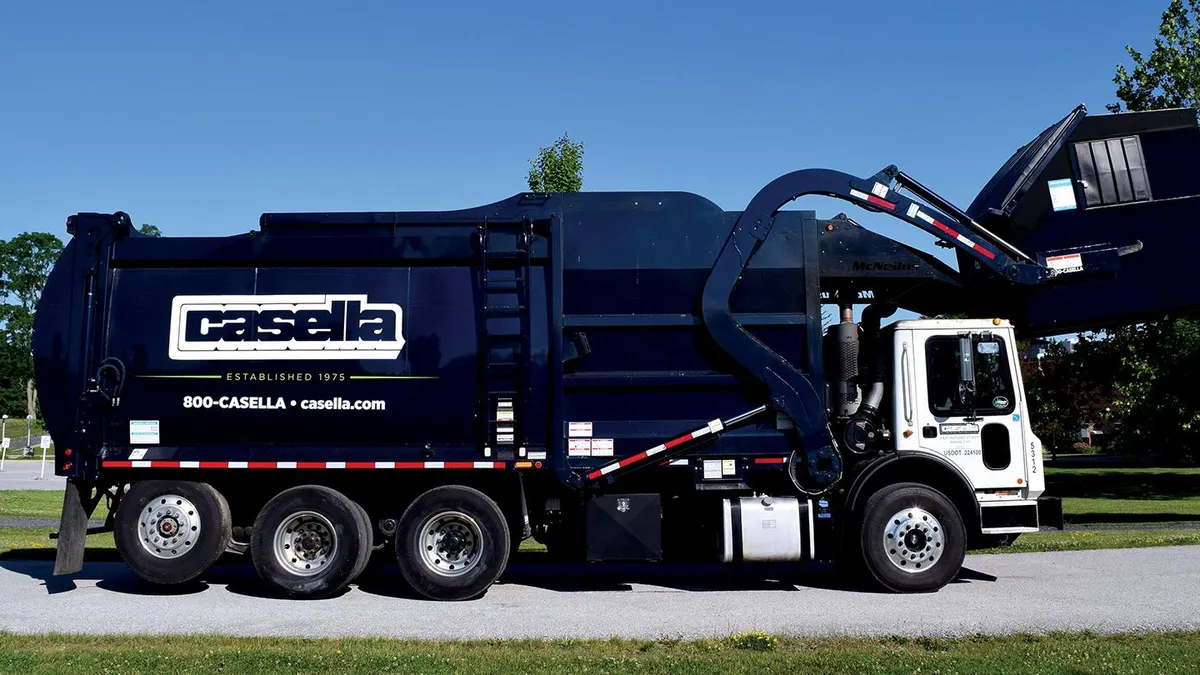Dive Brief:
- Since his family started Casella Waste Systems more than 40 years ago, CEO John Casella has seen recycling mature from what was once a "leap of faith" to a thriving industry. "For a long time, recycling’s greatest flaw was while it made sense environmentally, it didn’t make a whole lot of sense economically," he said during the Northeast Resource Recovery Association's (NRRA) annual conference in Manchester, NH on May 22. Now, despite recent financial difficulties, Casella believes the prospects are much brighter, saying, "There is no more exciting time to be involved in recycling."
- Though Casella cautioned that this progress could be undermined by an "unrealistic expectation" that recycling should be free. "The fundamental and ironic problem is despite the high social and environmental value that we place on recycling, society has saddled it with an unrealistic expectation that it should be free. Recycling is not free," he said. Among his recommendations for capturing more value from the recycling stream, Casella said he would like to see bottle bills go away because that keeps some of the best material from companies.
- As for the trend toward organics processing — including a mandate in his home state of Vermont — Casella was more skeptical. "There’s going to be a lot of money invested and in my belief there’s going to be a lot of money lost," said Casella. His company does offer organics collection and processing, though Casella said the industry can't make "the same mistake" of not charging enough for those services as they did with recyclables.
Dive Insight:
Because of its Northeast focus, Casella Waste Systems is well-acquainted with the financial realities of providing services in states or municipalities with more stringent recycling policies. According to Casella, the company has invested $13.7 million in equipment at material recovery facilities since 2013 and their Boston facility was the first single-stream operation in the region. They were affected by commodity declines in recent years, though less so because municipal contracts comprise a smaller portion of their business and they have begun implementing a "sustainability/recycling adjustment" fee to account for fluctuations.
Casella often talks about the idea of needing to see return on invested capital when it comes to recycling, though with organics it may be harder to see where that return will come from in the near future. Some cities such as San Francisco that make this priority have had to increase their collection rates as a result. Others are either choosing to pay more out of their own municipal budgets or can make the case that organics diversion will be cheaper than high regional tip fees. For cities such as Denver that have abundant regional landfill space this can be a tougher sell.
Even in the areas that have public policies committed to organics diversion, implementation can require some adjustment from local haulers. Vermont, which has a law in place to ban all organics disposal by 2020, recently delayed a requirement for haulers to offer the service by one year. During his speech, Casella said he believes Vermont's implementation of their universal recycling law shouldn't happen so quickly and needs to be reassessed. He mentioned the potential inefficiencies of curbside organics collection in rural areas as a key example. In a later session during the NRRA event, a representative of Vermont's Department of Environmental Conservation said that drop-off sites are a good solution for these areas and indicated that the state is still on track for its 2020 target.
As the industry works through the organics adaptation period — and continues adjusting to recycling markets — the experiences of Northeast states will provide a useful blueprint for others to follow.










